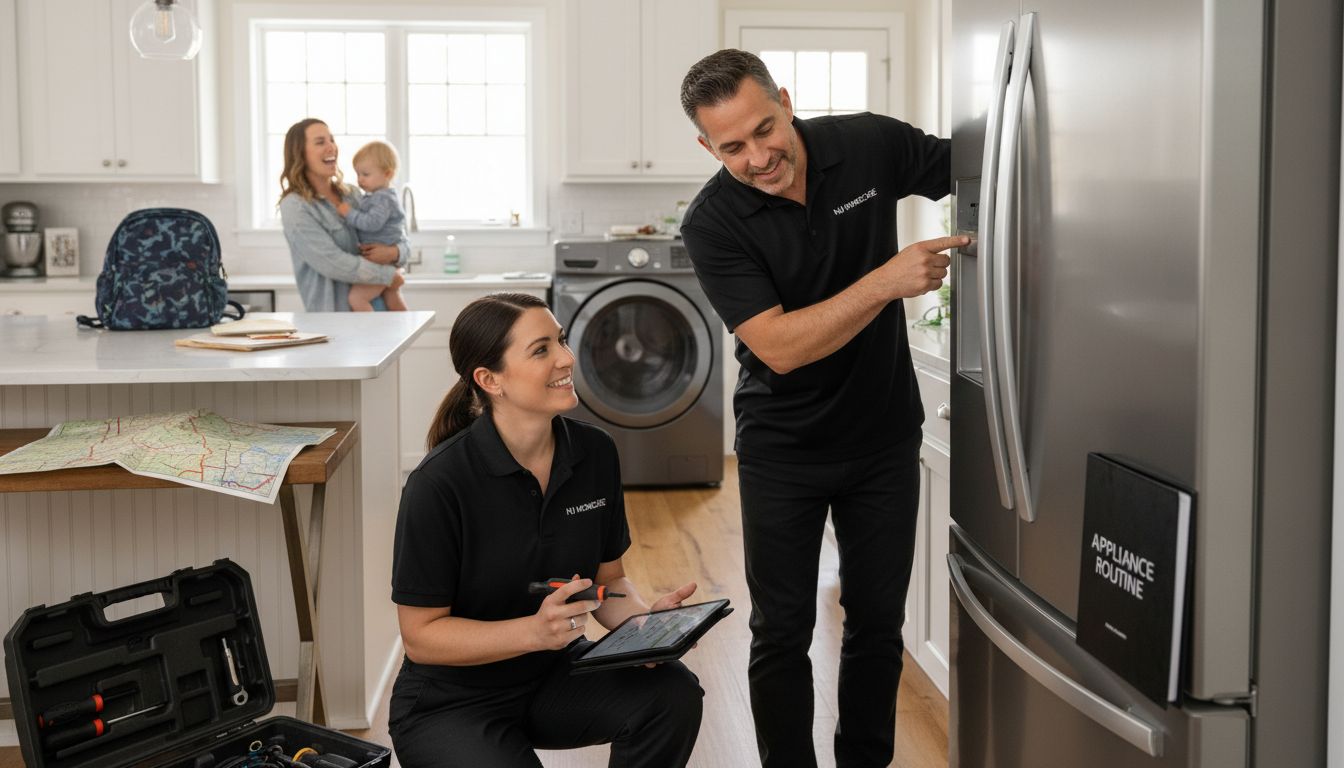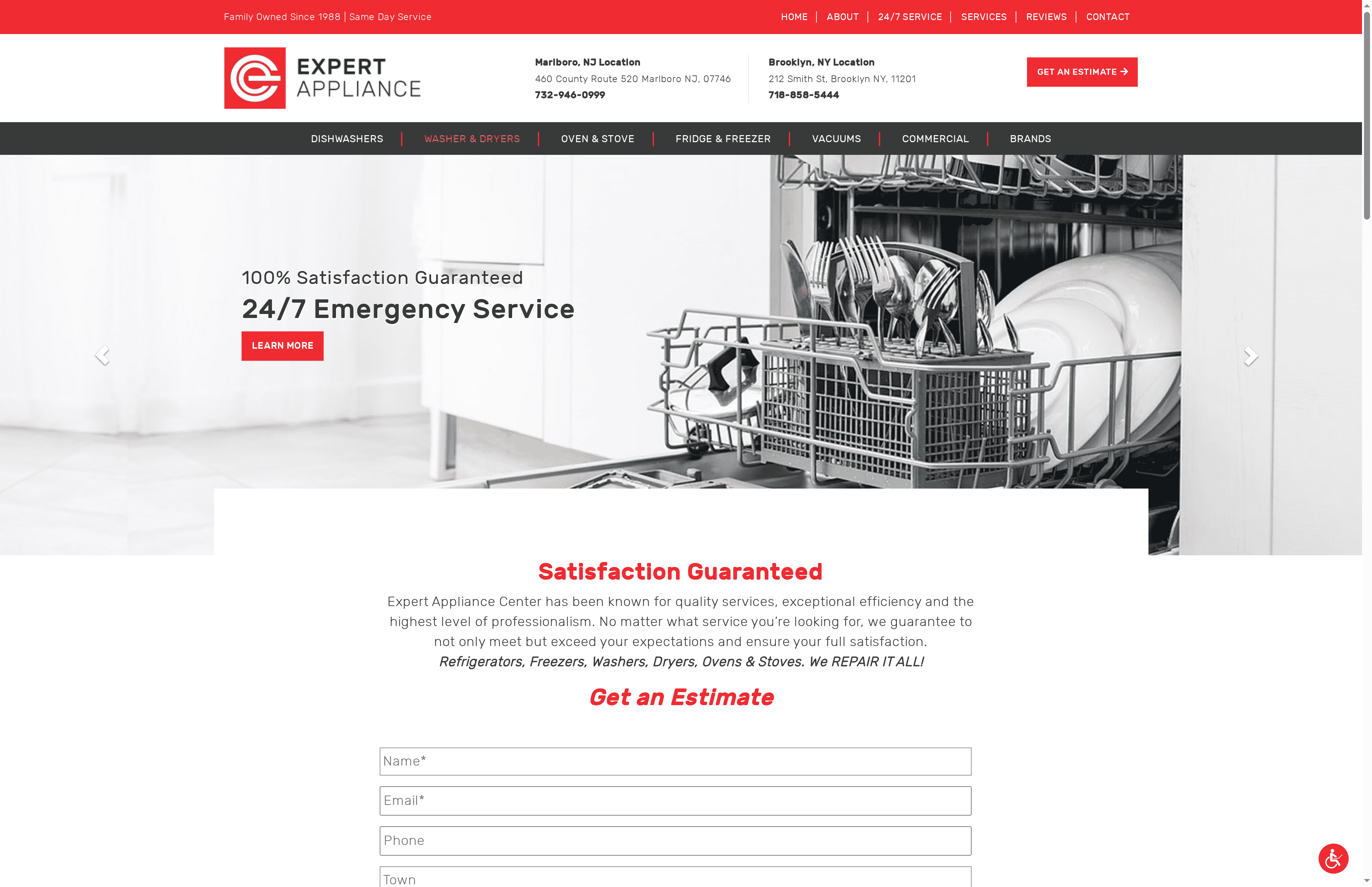Every american household relies on home appliances, yet more than 40 percent of unexpected equipment failures are linked to poor or irregular maintenance. When a fridge stops chilling or a washer leaks, the inconvenience and expense can be overwhelming. Recognizing the importance of appliance maintenance helps families avoid these headaches, cut unnecessary costs, and keep their homes safe. This guide explains how smart care can protect your appliances and save money over time.
Table of Contents
- Defining Appliance Maintenance And Its Importance
- Types Of Appliance Maintenance For Homeowners
- Essential Routine Maintenance Tasks Explained
- Benefits Of Regular Appliance Maintenance
- Costs, Risks, And Common Mistakes To Avoid
Key Takeaways
| Point | Details |
|---|---|
| Importance of Appliance Maintenance | Regular maintenance prevents unexpected breakdowns, extends equipment lifespan, and enhances energy efficiency. |
| Types of Maintenance | Homeowners should employ preventive, predictive, and corrective maintenance strategies for optimal appliance performance. |
| Routine Maintenance Tasks | Key tasks include cleaning refrigerator coils, inspecting washing machine hoses, and maintaining dryer vents to ensure safety and efficiency. |
| Benefits of Consistent Care | Regular maintenance leads to cost savings, improved safety, and longevity of appliances, ultimately protecting household investments. |
Defining Appliance Maintenance and Its Importance
Appliance maintenance is a proactive approach to preserving and extending the functional life of household equipment through systematic inspection, cleaning, and repair. According to rsisinternational.org, maintenance involves “any action taken on anything to keep it working or restore it to a good working condition.”
At its core, appliance maintenance represents a strategic process designed to prevent unexpected breakdowns and ensure consistent performance of critical home devices. By regularly examining and servicing appliances, homeowners can identify potential issues before they escalate into expensive repairs or complete equipment failure. Regular maintenance helps protect your investment and maintains the efficiency of your household equipment.
The key objectives of appliance maintenance include:
- Preventing unexpected equipment failures
- Extending the operational lifespan of appliances
- Maintaining optimal energy efficiency
- Reducing long-term repair and replacement costs
- Ensuring safe and reliable household operation
From a reliability perspective, Wikipedia highlights that effective maintenance planning increases cost-effectiveness and machine uptime while providing a comprehensive understanding of operational risks. For New Jersey homeowners, this translates into practical benefits: fewer disruptions, lower utility expenses, and greater peace of mind knowing your essential home appliances are functioning smoothly.
Types of Appliance Maintenance for Homeowners
Homeowners in New Jersey can approach appliance maintenance through several strategic methods, each designed to preserve equipment functionality and prevent unexpected breakdowns. According to Wikipedia, operational maintenance involves routine care that does not require advanced technical expertise, including inspecting, cleaning, servicing, lubricating, and making minor adjustments to household appliances.
The primary types of appliance maintenance can be categorized into three fundamental approaches:
- Preventive Maintenance: Regular scheduled inspections and servicing before problems emerge
- Predictive Maintenance: Using diagnostic tools and techniques to anticipate potential equipment failures
- Corrective Maintenance: Addressing and repairing issues after they have been detected
Reliability-centered maintenance offers sophisticated strategies for managing potential appliance risks, including proactive tasks that help homeowners understand and mitigate potential equipment failures. For New Jersey households, this means developing a systematic approach to maintaining refrigerators, washers, dryers, ovens, and other critical home appliances.
Professional technicians often recommend a combination of these maintenance types to ensure optimal appliance performance. While some tasks can be performed independently, others require specialized knowledge and tools. By understanding these maintenance categories, homeowners can develop a comprehensive strategy that extends equipment lifespan, reduces unexpected repair costs, and maintains household efficiency.
Essential Routine Maintenance Tasks Explained
Maintaining household appliances requires a systematic approach to prevent unexpected breakdowns and ensure optimal performance. According to AARP, homeowners should focus on specific routine maintenance tasks that can significantly extend the lifespan and efficiency of their appliances.
Key routine maintenance tasks for different household appliances include:
- Refrigerator Maintenance:
- Clean condenser coils every 6 months
- Check door seals for proper alignment
- Maintain optimal temperature settings
Washing Machine Care:
- Replace water hoses every 3-5 years
- Clean detergent dispensers monthly
- Run empty cleaning cycles periodically
Dryer Maintenance:
- Clean lint trap after every load
- Inspect and clean dryer vents annually
- Check and clean exhaust hoses
As recommended by Homebuyer, creating a structured maintenance schedule is crucial for preventing potential issues. This includes tasks like quarterly oven interior cleaning, replacing HVAC filters every 30-60 days, and draining water heaters annually to remove sediment buildup.
For New Jersey homeowners, professional appliance maintenance services can provide comprehensive inspections and help identify potential issues before they become costly repairs. While some maintenance tasks can be handled independently, complex diagnostics and repairs often require expert intervention to ensure the longevity and efficiency of your household appliances.
Benefits of Regular Appliance Maintenance
Regular appliance maintenance offers New Jersey homeowners numerous critical advantages that extend far beyond simple equipment upkeep. According to AARP, consistent maintenance enhances energy efficiency, extends appliance lifespans, and prevents potentially expensive repairs by addressing minor issues before they escalate.
The key benefits of regular appliance maintenance include:
- Cost Savings: Preventing major breakdowns reduces repair and replacement expenses
- Energy Efficiency: Well-maintained appliances consume less electricity
- Safety: Reducing risks of electrical failures and potential fire hazards
- Performance: Ensuring optimal functioning of household equipment
- Longevity: Extending the operational life of expensive appliances
Home Alliance emphasizes that essential maintenance tasks not only ensure safe and efficient appliance operation but also significantly contribute to overall home safety. For example, regularly cleaning dryer vents can prevent potential fire risks and maintain appliance performance.
Through proactive maintenance strategies, New Jersey homeowners can transform routine upkeep from a mundane task into a strategic approach for protecting their household investments. By dedicating time and resources to systematic maintenance, residents can enjoy peace of mind, lower utility bills, and consistently reliable home appliances.
Costs, Risks, and Common Mistakes to Avoid
Maintaining household appliances requires strategic planning and awareness of potential financial and safety risks. According to Enthralling Gumption, neglecting routine maintenance can lead to substantial unexpected expenses and dangerous home environments.
Common maintenance mistakes that New Jersey homeowners should avoid include:
- Ignoring Warning Signs: Dismissing strange noises or performance changes
- Skipping Regular Inspections: Failing to check appliances for wear and potential issues
- DIY Repairs Without Expertise: Attempting complex repairs without professional knowledge
- Delaying Replacement of Worn Components: Postponing critical part replacements
- Inconsistent Cleaning and Maintenance: Irregular servicing of appliance systems
Some of the most significant risks associated with poor appliance maintenance involve potential catastrophic failures. For instance, neglected washing machine hoses can burst and cause extensive water damage, while clogged dryer vents represent serious fire hazards that could compromise home safety.
Emergency repair services become crucial when preventative maintenance falls short. By understanding these risks and investing in consistent, professional maintenance, New Jersey homeowners can protect their appliances, minimize unexpected repair costs, and ensure the long-term safety and efficiency of their household equipment.
Protect Your New Jersey Home with Expert Appliance Maintenance
Facing sudden appliance breakdowns or costly repairs can disrupt your daily life and stretch your budget. This article highlights the importance of preventive and predictive maintenance to keep your appliances running efficiently and safely. Don’t let overlooked signs or delayed servicing lead to expensive emergencies or safety hazards. Whether it is your refrigerator, washer, dryer, or oven, staying on top of routine care is essential for peace of mind.
Take control today with reliable service from Expert Appliance Repair. Our Marlboro-based team offers fast, experienced support tailored to the needs of New Jersey homeowners. We specialize in comprehensive maintenance and repairs designed to extend the life of your appliances and save you money. Visit our Appliance Archives – Expert Appliance for helpful tips or schedule same-day professional maintenance through our main site at https://expertapplianceinc.com. Let us help you prevent costly breakdowns and keep your home running smoothly now.
Frequently Asked Questions
What is appliance maintenance?
Appliance maintenance refers to the proactive measures taken to preserve and extend the functional life of household equipment through systematic inspection, cleaning, and repair.
Why is regular appliance maintenance important?
Regular appliance maintenance helps prevent unexpected breakdowns, extends the lifespan of appliances, maintains energy efficiency, reduces long-term repair costs, and ensures the safe operation of household equipment.
What are the main types of appliance maintenance?
The main types of appliance maintenance include preventive maintenance, predictive maintenance, and corrective maintenance. Preventive maintenance involves routine care to prevent issues, predictive maintenance anticipates potential failures using diagnostics, and corrective maintenance addresses problems after they have been identified.
What are some essential routine maintenance tasks for appliances?
Key routine maintenance tasks include cleaning refrigerator condenser coils, replacing washing machine water hoses, cleaning dryer lint traps, and regularly inspecting and cleaning HVAC filters. These tasks help ensure optimal performance and prevent costly repairs.




